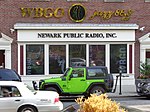The Knickerbocker Hotel

The Knickerbocker Hotel is a hotel at Times Square, on the southeastern corner of Broadway and 42nd Street, in the Midtown Manhattan neighborhood of New York City. Built by John Jacob Astor IV, the hostelry was designed in 1901 and opened in 1906. Its location near the Theater District around Times Square was intended to attract not only residential guests but also theater visitors. The Knickerbocker Hotel is largely designed in the Beaux-Arts style by Marvin & Davis, with Bruce Price as consultant. Its primary frontages are on Broadway and 42nd Street. These facades are constructed of red brick with terracotta details and a prominent mansard roof. The Knickerbocker Hotel also incorporates an annex on 41st Street, built in 1894 as part of the St. Cloud Hotel, which formerly occupied the site. The 41st Street facade contains a Romanesque Revival design by Philip C. Brown. Inside, the hotel contains 300 rooms, a restaurant, a coffee shop, and a roof bar. The original interior design was devised in 1905 by Trowbridge & Livingston. There are scattered remnants of the original interior design, including an entrance that formerly led from the New York City Subway's Times Square station to the hotel's basement. The original hotel, which served as the home of Enrico Caruso and George M. Cohan, shuttered in 1920 following a decrease in business. The building was then converted to offices, becoming known as the Knickerbocker Building. It was the home of Newsweek magazine from 1940 to 1959 during which it was called the Newsweek Building. After major renovations in 1980, it became known as 1466 Broadway and was used as garment showrooms and offices. Following another renovation in 2001, it was known as 6 Times Square. The Knickerbocker was added to the National Register of Historic Places in 1980 and was designated a New York City Landmark in 1988. It was converted back to a hotel from 2013 to 2015 under its original name.
Excerpt from the Wikipedia article The Knickerbocker Hotel (License: CC BY-SA 3.0, Authors, Images).The Knickerbocker Hotel
Broadway, New York Manhattan
Geographical coordinates (GPS) Address Nearby Places Show on map
Geographical coordinates (GPS)
| Latitude | Longitude |
|---|---|
| N 40.755277777778 ° | E -73.986666666667 ° |
Address
42nd Street–Times Square–Port Authority Bus Terminal
Broadway
10019 New York, Manhattan
New York, United States
Open on Google Maps







